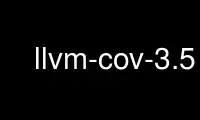
This is the command llvm-cov-3.5 that can be run in the OnWorks free hosting provider using one of our multiple free online workstations such as Ubuntu Online, Fedora Online, Windows online emulator or MAC OS online emulator
PROGRAM:
NAME
llvm-cov - emit coverage information
SYNOPSIS
llvm-cov [options] SOURCEFILE
DESCRIPTION
The llvm-cov tool reads code coverage data files and displays the coverage information for
a specified source file. It is compatible with the gcov tool from version 4.2 of GCC and
may also be compatible with some later versions of gcov.
To use llvm-cov, you must first build an instrumented version of your application that
collects coverage data as it runs. Compile with the -fprofile-arcs and -ftest-coverage
options to add the instrumentation. (Alternatively, you can use the --coverage option,
which includes both of those other options.) You should compile with debugging information
(-g) and without optimization (-O0); otherwise, the coverage data cannot be accurately
mapped back to the source code.
At the time you compile the instrumented code, a .gcno data file will be generated for
each object file. These .gcno files contain half of the coverage data. The other half of
the data comes from .gcda files that are generated when you run the instrumented program,
with a separate .gcda file for each object file. Each time you run the program, the
execution counts are summed into any existing .gcda files, so be sure to remove any old
files if you do not want their contents to be included.
By default, the .gcda files are written into the same directory as the object files, but
you can override that by setting the GCOV_PREFIX and GCOV_PREFIX_STRIP environment
variables. The GCOV_PREFIX_STRIP variable specifies a number of directory components to be
removed from the start of the absolute path to the object file directory. After stripping
those directories, the prefix from the GCOV_PREFIX variable is added. These environment
variables allow you to run the instrumented program on a machine where the original object
file directories are not accessible, but you will then need to copy the .gcda files back
to the object file directories where llvm-cov expects to find them.
Once you have generated the coverage data files, run llvm-cov for each main source file
where you want to examine the coverage results. This should be run from the same directory
where you previously ran the compiler. The results for the specified source file are
written to a file named by appending a .gcov suffix. A separate output file is also
created for each file included by the main source file, also with a .gcov suffix added.
The basic content of an llvm-cov output file is a copy of the source file with an
execution count and line number prepended to every line. The execution count is shown as -
if a line does not contain any executable code. If a line contains code but that code was
never executed, the count is displayed as #####.
OPTIONS
-a, --all-blocks
Display all basic blocks. If there are multiple blocks for a single line of source
code, this option causes llvm-cov to show the count for each block instead of just
one count for the entire line.
-b, --branch-probabilities
Display conditional branch probabilities and a summary of branch information.
-c, --branch-counts
Display branch counts instead of probabilities (requires -b).
-f, --function-summaries
Show a summary of coverage for each function instead of just one summary for an
entire source file.
--help Display available options (--help-hidden for more).
-l, --long-file-names
For coverage output of files included from the main source file, add the main file
name followed by ## as a prefix to the output file names. This can be combined with
the --preserve-paths option to use complete paths for both the main file and the
included file.
-n, --no-output
Do not output any .gcov files. Summary information is still displayed.
-o=<DIR|FILE>, --object-directory=<DIR>, --object-file=<FILE>
Find objects in DIR or based on FILE's path. If you specify a particular object
file, the coverage data files are expected to have the same base name with .gcno
and .gcda extensions. If you specify a directory, the files are expected in that
directory with the same base name as the source file.
-p, --preserve-paths
Preserve path components when naming the coverage output files. In addition to the
source file name, include the directories from the path to that file. The
directories are separate by # characters, with . directories removed and ..
directories replaced by ^ characters. When used with the --long-file-names option,
this applies to both the main file name and the included file name.
-u, --unconditional-branches
Include unconditional branches in the output for the --branch-probabilities option.
-version
Display the version of llvm-cov.
EXIT STATUS
llvm-cov returns 1 if it cannot read input files. Otherwise, it exits with zero.
Use llvm-cov-3.5 online using onworks.net services